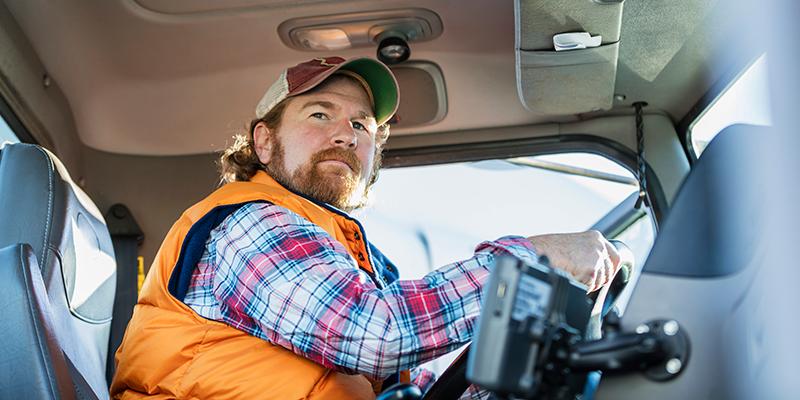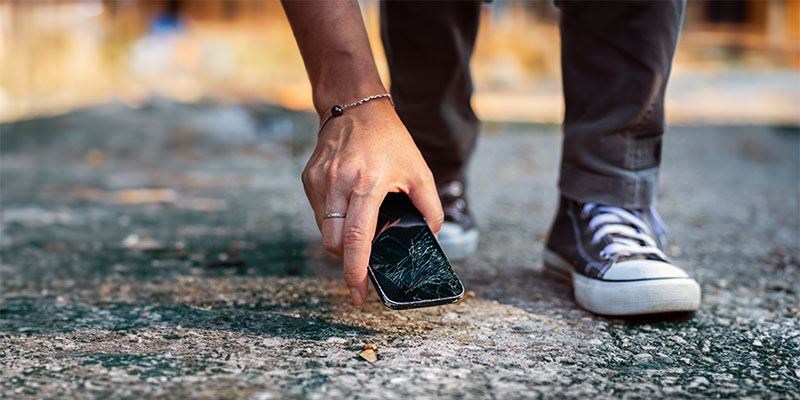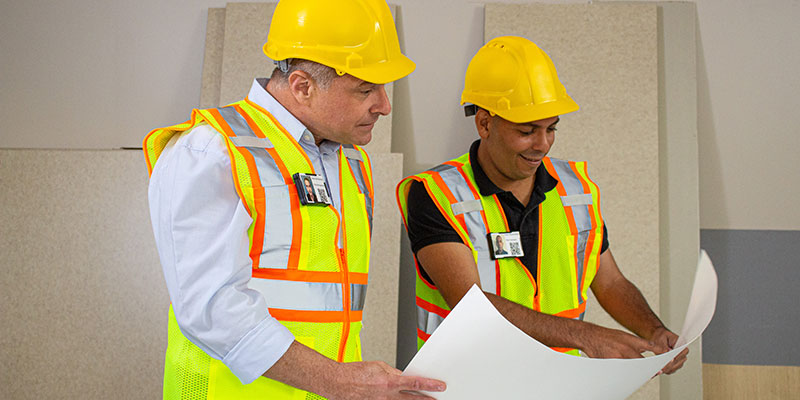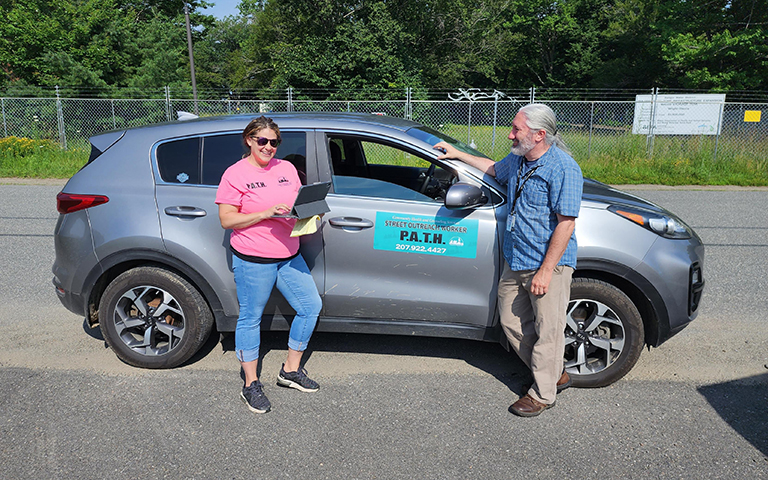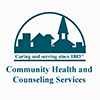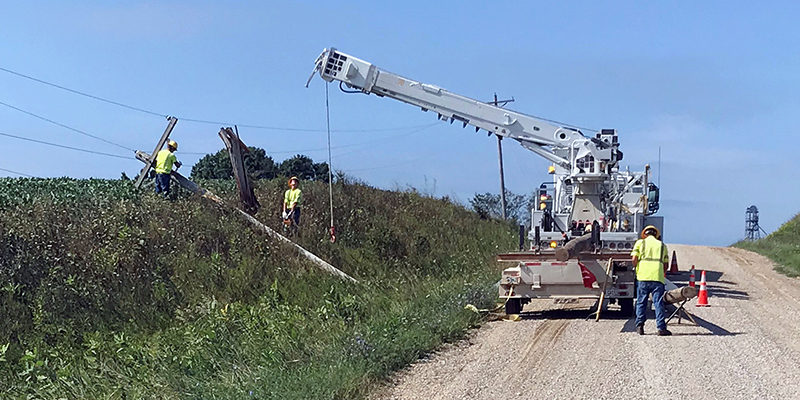READ THE FULL STORY
How can your organization duplicate these incredible results?
Get details on how CHCS:
- accomplished its goals
- invested money wisely
- reinvested in mobile technology by partnering with UScellular® for wireless solutions.
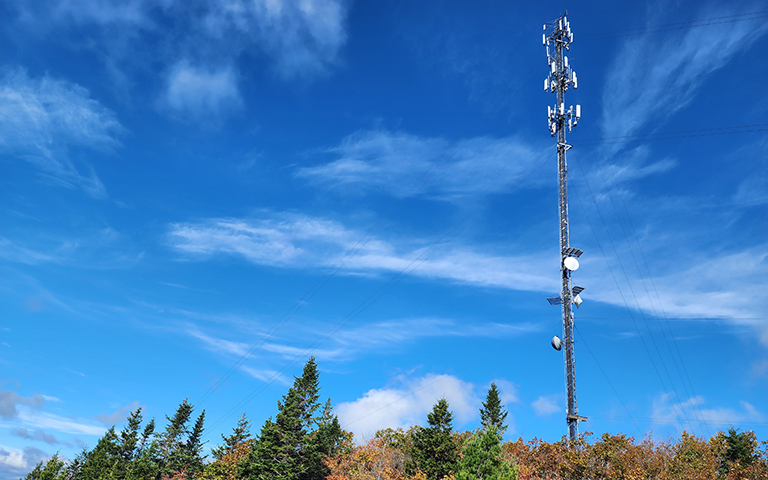
The Chick Hill UScellular tower in Clifton, Maine. Photo by Chrissy Doyle
Kristy Fogler, organizational development manager for Community Health and Counseling Services (CHCS), says she doesn’t have any typical patients. There’s no such thing as an average day or person in need at her not-for-profit agency.
Her team performs many social worker services. “We work with hospitals, nursing homes, the Maine Department of Social Services, foster home placement and homeless shelters as part of our organization,” Fogler said. “We also work with the police force and fire department because we’re often being called to heightened situations with a client in crisis.”
Headquartered in Bangor, in central Maine, CHCS also provides home health and hospice services. “These patients might be undergoing a knee replacement and need physical therapy or nursing services. So we go into the home and provide those services.”
Critical Need for Connectivity
That’s why it’s so important for her team to have reliable connectivity. To serve patients in vast rural areas of Maine, her team switched to UScellular.
“We had large gaps in zones of no connectivity,” Fogler said. “Our work is very challenging and very remote and can also be very critical. We rely on accurate, urgent information for hospice patients and need to know what medications they’re on. Or if we have a client in crisis that’s in a homeless encampment, those places do not have Internet service.
“We need Internet to access critical information. Connectivity is really the center of everything that we need to focus on, including documentation and data, our iPad systems and having good connectivity in our rural areas,” Fogler said, adding that cell phone consistency and calling for emergency services, or calling for just general communication, is vital.
Before switching from another major carrier to UScellular, CHCS lacked reliable connectivity in remote locations, up-to-date equipment or even adequate funding.
Fogler said her staff relies on high-end technical devices to complete their duties, but they were using a variety of old devices with mismatched capabilities, so they might need three phones to do one job. In addition, high-tech devices help them attract and retain staff.
“We also are a non-for-profit agency. It is just as it sounds. We do a lot of hard work and unfortunately the funding behind all that hard work is not always equivalent, so we were struggling at balancing that high level of technical ability and availability with affordable cost per month,” Fogler said.
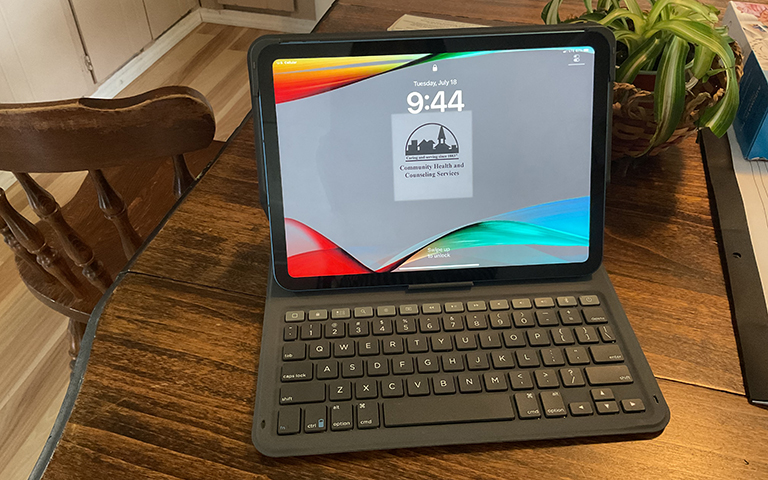
An iPad purchased from UScellular that CHCS attaches a Bluetooth keyboard for easy typing by field clinicians.
The UScellular Solution
That’s when her UScellular Account Manager came on board to help. “She offered us really good rates on the latest generation iPads” and they purchased 75 new. In addition, the city of Bangor saw what the iPads could do for her staff out in the field and decided to give the agency money to purchase additional tablets. “Our account manager was great. She got those iPads in the hands of our clinicians within two weeks and they’re able to go out into the homeless encampments and work with clients to complete housing applications, etc., getting immediate signatures with no downtime,” Fogler said.
In addition to iPads, CHCS also has 58 smartphones and 25 hotspots, which it uses for telehealth therapy with students in schools that have poor internet service.
These students may be part of their foster home program and might be having virtual meetings with their birth parents under a CHCS case manager, foster home developer or a mental health provider. “These kids need iPads,” she said.
“The reality is that they allow us immediate communication and access to critical information where the client is located, as opposed to clients coming to a health facility. These tablets and phones allow us to do our work and meet the clients and patients where they are AT and really fulfill our mission to serve the communities,” Fogler said.
Becoming More Productive and Serving More Patients
CHCS’ switch to UScellular paid off for them. Fogler says they are saving $700-$800 per month. In addition, they are spending less manpower in IT supporting devices. “Prior to the merge with UScellular we were allotting anywhere from 10% to 15% of full-time persons triaging issues, plus we would have anywhere from I’d say three to four staff members with at least 50% part of their day down because of the equipment that just wasn’t reliable.” With UScellular, Fogler says that number is down to 2% now.
She also says that with the deal they made with UScellular, they can afford to have spare iPads on hand in case a device is lost or damaged. Staff no longer has to miss work in the field because of lack of working equipment.
Another result that can’t be measured monetarily is ease of following regulations. “Home health and hospice is particularly regulated. We oftentimes have five days from the moment we see a patient in the home to when a piece of paperwork that is signed by that patient has to be in the hands of our administrative staff and documented in the electronic medical records (EMRs),” Fogler explained.
“Through improved reliability and connectivity of our devices, we’re able to use scanning apps, which are confidential and HIPPA-compliant, and get paperwork done the same day,” she said.
Fogler also says the increased efficiencies of their equipment allow them to see more patients, although right now they lack medical staff to be as productive as possible. But she credits her partnership with UScellular to being able to serve more clients.
“If we didn’t have this connectivity, it would basically stop our safe treatment of our clients. We certainly wouldn’t abandon the patients. We would do what we needed to do. However, it wouldn’t be safe or effective.
“And so, if we had to take all of those iPads away, we would drastically cut our ability to see patients probably tenfold because we would have to research everything at the office, go quickly and see that patient, make sure nothing changed. God forbid they had any type of issues that we needed to get an immediate order in the system,” Fogler said.
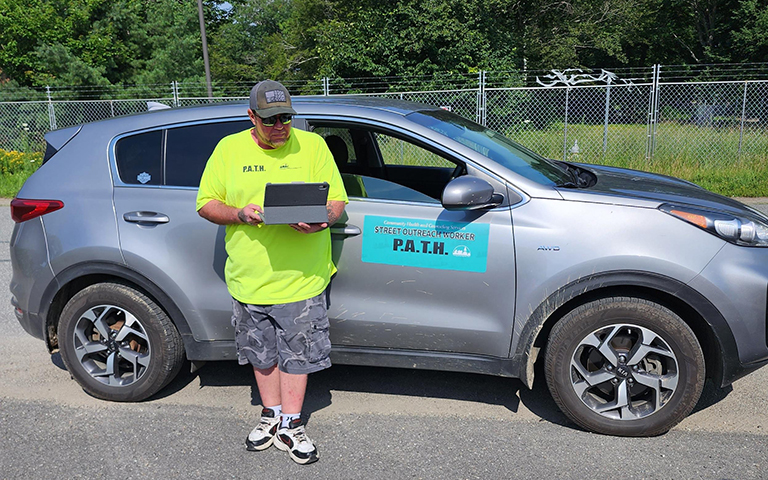
PATH is an outreach and engagement service provided to homeless persons with a mental illness, substance abuse or co-occurring disorder.
Sharing Experiences with Other Agencies
Fogler is generous in sharing her advice to any non-profit looking to improve their connectivity and tech.
She says that if an agency is looking for improvement in their communication and IT infrastructure, they really have to look at all of the potential cost savings that aren’t always just the bottom lines.
“It’s really looking holistically at a return on investment based on all of the factors, as well as looking at their business and where they might be able to consolidate.
“I think that if an agency has lots of different facets—and most agencies do, from desk phones to hotspots to Internet services to all of the things that an agency might have, really looking at everything and seeing what they can bring under one umbrella with one company can certainly improve their buying power,” she said.

The beautiful Maine shoreline at Boothbay Harbor. Photo by Chrissy Doyle
Why UScellular
It’s simple. Fogler likes her account rep, plus she appreciates that UScellular has a reputation in the state of Maine for having good service in remote areas.
“Maine people like Maine companies and I think that it kind of goes with the territory,” she said. “I feel that familiarity of UScellular and its imprint in the state is positive.
“I will also say that the customer interaction with our account rep and her team on transparency, being clear, being open, giving a really good offer on the table right at the get go, was important. They listened and served our agency’s needs and understood our goals. Their low-pressure type of sales pitch was more appreciated than, ‘gee make sure you come with us because we’ll do better than the other guys.’ They talked more about what our agency needs and ‘let me show you how we can do it’ and we appreciated that effort more,” Fogler said.
The UScellular account rep added that her aim was to understand CHCS’ mission and create a plan how to help them best serve the community at a competitive rate that they’re able to afford. “We are always trying to be part of the community, sponsoring community fairs…so I think being able to have this outreach with CHCS gives them the recognition they deserve,” they said.
